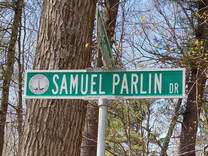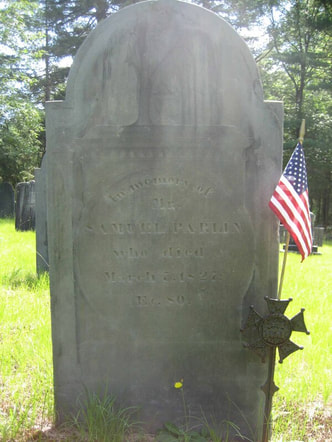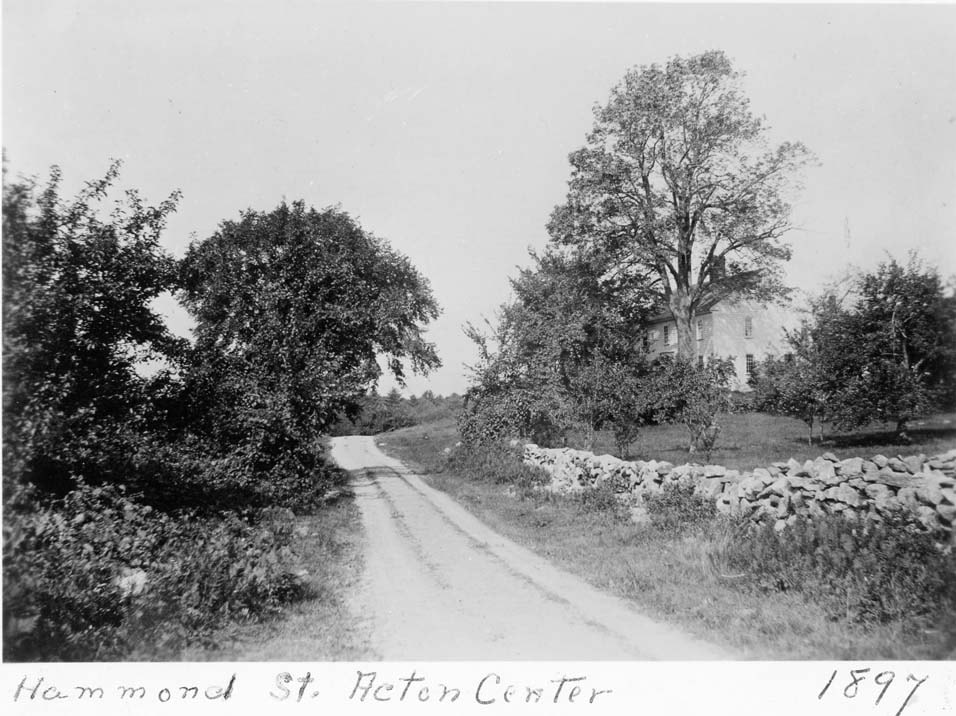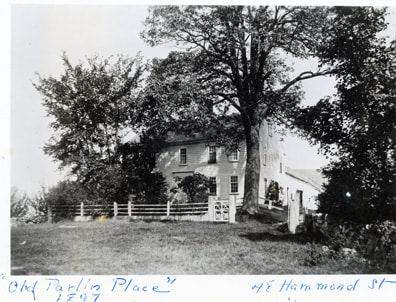Samuel’s family connections made it highly likely that Samuel also served in the Revolution. Samuel’s brothers Asa and Nathan and many of their relatives served. Samuel also had many soldiers in his family on his wife’s side; she was Lucy Davis, first cousin to Captain Isaac Davis who led the Acton minutemen and fell at Concord’s North Bridge. We checked our standard town histories by Fletcher and Phalen, both of which reprinted Rev. James T. Woodbury’s listing of Actonians who were known (at the time the list was created, sometime in the mid-1800s) to have served in the Revolution. The list is not perfect, and Rev. Woodbury acknowledged at the time that it was incomplete. However, Samuel Parlin did appear in that listing. Some of his children and other relatives living in Acton were the likely sources. Our next challenge was to try to determine when Samuel actually served. Fortunately, our quest was made much easier when we were able to turn to the Robbins papers in our own archives. Not every man who served is listed there either, but for lucky people researching certain individuals, the papers can be a goldmine. It happens that Samuel Parlin was listed as one of the Actonians who signed up on September 29, 1774, “thinking our Selves Ignorant in the Military Art and Willing to be Instructed” by Captain Joseph Robbins in a militia company. Later, Captain Robbins documented the fact that Samuel Parlin had served under him in 1776 (as did his brothers Nathan and Asa). We also discovered that much later, Concord’s Gazette and Yeoman listed those who were living in Acton in April 1824 who had fought at Concord on April 19, 1775. Samuel Parlin was included. (April 24, 1824, p. 2) Having confirmed that Samuel Parlin did indeed serve in the Revolutionary War, we set out to learn about the rest of his life. Samuel was born in Acton on May 18, 1747 to Jonathan Parlin and Sarah Warner. His family were among of the original residents of Acton when it became a town in 1735. They lived in the northern part of Acton (previously Concord) that eventually became Carlisle. A map of historic home sites done by Donald Lapham in 1969 shows that the Jonathan Parlin house was located at 322 West Street (at the corner of Acton Street) in present-day Carlisle. According to The Descendants of Nicholas Parlin, Samuel had numerous siblings, the oldest of whom (Jonathan) died as a soldier in the French and Indian War in 1758. The book lists two brothers (Nathan and Asa) serving in the Revolution and, with some question, an additional soldier brother Nathaniel. Aside from a muster and payroll record indicating that “Nathaniel” Parlin marched from Acton to Roxbury on March 4, 1776 and served six days, we could find no vital or other records for a man of that name. It is very likely that the record was actually Nathan’s. Samuel had a sister Elizabeth who never married, and as the Parlin genealogy added, unhelpfully, “There were four other children, all girls.” (p. 22). We were able to find in Acton’s vital records that Samuel had three additional sisters, Sarah, Lucy, and Mary. Sarah died in 1759. Acton death records do not mention Lucy and Mary, but they must have died before their father, as his probate record does not list them as survivors. (It also does not list a son Nathaniel.) Samuel’s father Jonathan died in 1767. His estate included an 87-acre farm, partly in Acton and partly in Westford, bordering on the land of John Heald Jr. The farm was left 1/3 to Samuel’s mother, as was customary, and 2/3 to the eldest surviving brother Nathan who lived out his life in Carlisle. Asa eventually farmed nearby and served the town of Carlisle for many years as town clerk and selectman. Samuel Parlin, however, moved to a part of town that remained Acton. On March 26, 1772, he married Lucy Davis (1749-1829), daughter of John and Sarah (Flint) Davis of Acton. Samuel and Lucy had eight children:
We know that Samuel Parlin lived at what would now be 48 Hammond Street. The house, which stood until a tragic fire in 1985, was believed to have been built approximately 1772 -1776, presumably based on the date of Samuel’s marriage to Lucy Davis. Supporting that estimate, we found that in the tax valuation of 1771, Samuel was listed without taxable property, but in Lucy’s father’s 1778 probate record, Samuel Parlin was already a landowner. Lucy inherited eight acres of pasture and woodland, known as part of the “Proctor Place” that bordered land of “Samuel Parling.” The probate record also noted that Lucy’s father had previously given her 86 pounds, 19 shillings and 9 pence, probably the value of land John gave to Lucy and Samuel as they started their life together. Lucy inherited an additional thirty-acre lot on the “westerly side of Nagog Hill” when her eldest brother John died in an accident on March 2, 1791. The lot was bounded by land that had been set off to her sister Abigail Conant and by land of Simon Tuttle and Samuel Jones Jr. Samuel first appears in Acton’s town meeting records as a fence viewer in 1776. He was clearly back from military service in 1780 because he was chosen selectman and assessor in that year. Starting in 1783, he was chosen regularly for roles such as constable, tithing man, assessor, surveyor of timbers or highways, and school committee. He was also selected as a member of special committees, for example to deal with abatements to individuals’ taxes and to deal with the selectmen about town expenditures. He was made a member of the committee to instruct the Convention at Concord in Oct. 1786 (probably the Middlesex County convention dealing with issues that led to Shay’s Rebellion). In May 1798, town meeting records show that he was selected for a special committee “In a Constitutional mannar to take under Consideration the alarming Situation of our publick affairs and express there minds thereon the Town Expressed there minds agreeable to this article and Chose Jonas Brooks John Edwards Jonas Heald Samuel Parling and Thomas Noys a Committee to publish the Same.” (This was probably related to tricky diplomatic issues with France.) It is clear that Samuel Parlin was a trusted figure in town, someone who could handle both money and negotiations amid controversy. According to church records, on Nov. 24, 1791, Samuel Parlin was chosen for the office of Deacon of the First Parish church of Acton. On April 19, 1792, the record continued that Samuel Parlin having declined, the church chose Simon Hunt who accepted and “took the seat” in August. While the Parlin genealogy refers to him as “Deacon Samuel,” there is no record that Samuel Parlin actually ever “took the seat” himself. The story of why he declined the honor never made it to the history books.  Samuel Parlin died on March 7, 1827, leaving his widow Lucy and four surviving children. At the time of his death, his real estate included the home farm containing 38 acres of land, a 5-acre “Sargent Meadow”, a 6-acre “Chaffin Meadow”, and an 11-acre “Littleton Pasture.” He also had the title to pew number 42 on the lower floor of the Acton Meeting house. Among his personal belongings were agricultural products and tools, cows, swine, sheep, and, oddly, ½ of a horse. Samuel’s widow Lucy survived him by two years, and eldest son Jonathan only by three. The home farm passed to son Davis in 1831. The house eventually went out of the family to Thomas Hammond whose name was given to the road on which they lived. When some of the land was developed in the late 1960s, the new road was given the name of Samuel Parlin Drive. Our research into Samuel Parlin reminded us of a few lessons that are worth repeating. Despite having found what looked like a very complete genealogy of the Parlin family, if we had not checked each item, we would have believed that Samuel had an additional brother named Nathaniel and that Samuel’s son Samuel Jr. lived to adulthood and married a woman named Phoebe. If we had only paid attention to the flag holder in Woodlawn Cemetery, we would have thought that Samuel’s military service was in the War of 1812, not the Revolution. And if we had stopped our searching at Massachusetts Soldiers and Sailors of the Revolutionary War, we would have missed Samuel’s service, the best documentation of which, ironically, is in our own archives. Some Sources Consulted:
Comments are closed.
|
Acton Historical Society
Discoveries, stories, and a few mysteries from our society's archives. CategoriesAll Acton Town History Arts Business & Industry Family History Items In Collection Military & Veteran Photographs Recreation & Clubs Schools |
Quick Links
|
Open Hours
Jenks Library:
Please contact us for an appointment or to ask your research questions. Hosmer House Museum: Open for special events. |
Contact
|
Copyright © 2024 Acton Historical Society, All Rights Reserved



 RSS Feed
RSS Feed